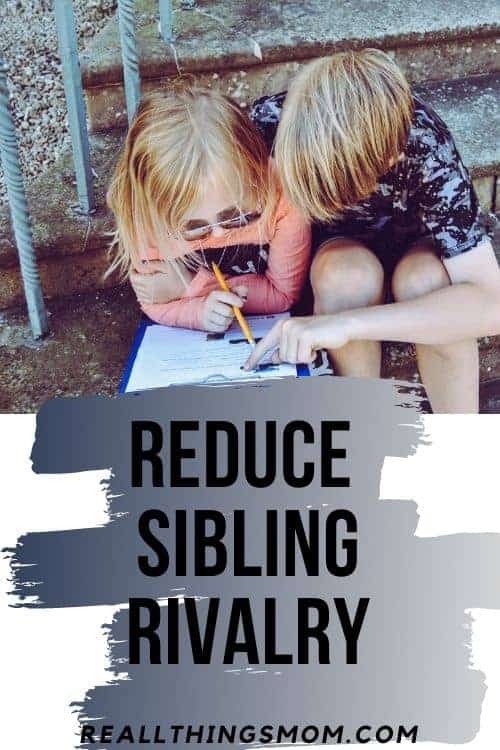
You’ve been cooped up with your kids for at least one week, if not more. Are you finding your new normal yet? Are you and your kids thriving and making the most of it? Or are your kids bickering and at each other and just driving you insane? The sibling rivalry in our home ebbs and flows.
I have two teenage sons with two years between them who share a bedroom and two daughters with three years between them who also share a bedroom. Yeah. The bickering and fighting can get a little out of control sometimes!
This is also an area that my husband and I are not completely on the same page about. Most of the time, we agree on how to handle these situations, but the way we have agreed to handle it is rarely my husband’s reaction to it. Bickering and fighting drive him mad and he almost always overreacts to it. Now, before you think that I’m criticizing my husband, I will be quick to say that I can overreact with the best of them! (It’s just usually over different issues)
In any case, our sons (and daughters) go through stages at which they are best friends and then they go through stages at which they are in complete disagreement over absolutely everything! We’re in that stage right now. And the fact that they haven’t gotten a real break from each other in a week is not helpful. Is anyone else feeling my pain?
There are a few things though that are essential when dealing with sibling rivalry. These ideas come mostly from my own research (and/or experience) and comments that other people have made about the topic. I have gained some valuable insight from people that I want to share with you!
Five Questions to Ask When Dealing with Sibling Rivalry:
- What is the Root of the Issue?
True sibling rivalry usually stems from a lack of attention or a felt need of one or both of the children. Jealousy is usually at the root of true sibling rivalry. (When I say ‘true sibling rivalry’ I mean a deeper issue than a simple, “She took my toy and I want it back” conflict.) Is the older child jealous that the younger one gets more attention? Is the younger child jealous that the older one has more privileges? You know how it goes! Often, there is a deeper issue or issues that are playing into the situation. Take the time to find out what that is and then do your part as the parent to remedy that.
- Is This a Big Deal?
There are some conflicts between siblings that are important and some that are not. For example, last night, one son got annoyed with the other and told him to “shut up.” That’s not language we use in our home, so the other quickly smacked his brother in the leg to “send the message that he will not tolerate being spoken to that way.” (Yes, that’s my first-born extra parent.) My husband quickly overreacted and pretty soon the issue had snowballed into a huge deal. This was not a big deal. This was brothers who have been cooped up together for awhile [not] dealing with their feelings.
In cases like these, my husband and I pretty much let it be. We break up the fight or argument, but we don’t really try to find out who did what. Sometimes, you just let sleeping dogs lie.
But there have been much bigger issues that have happened. That’s when parents do need to step in and help solve the problem. I don’t want relationships to be ruined over little or big things so sometimes, we have to step in and get to the bottom of what happened.
- “What Was Your Sin?”
Most of the time, my kids are more than willing to start their side of the story with, “He…. Or She…” We don’t allow this in our home. When we are trying to resolve a conflict, the question is “What was your sin?” It takes two to fight—so what was your part? This is especially good if the stories vary greatly! Each child will always work hard to present himself as blameless and in the best light. Teach them from an early age not to lie and to look at his or her own sin first!
- What Should You Do Next?
Moms, this one is tricky! When you have young children, you will need to help them answer this question, but it’s still a great habit to get into asking your child. When there has been a conflict, ask your child what he or she should do next! Help her to understand that it’s important to make things right so we can be friends again.
As your children get older, ask them this question and then…BE OKAY with their answers (at least to a point!) I have a lawyer child so if he ever read this, he would absolutely say, “Okay, next, I’m going to pummel my brother and you have to be okay with it because you said so right here!” Obviously, you still need to be a parent, but something you need to consider and know is that boys work out their issues SO DIFFERENTLY than girls! Men and women too!
There have been times when my sons are constantly at each other, fighting all day long. I have given them consequences and have refereed and nothing seems to work! Then I read a comment written by a man on this issue and his answer was: “Go outside and wrestle it out.” Guess what! It works! There are times when they just need to get it out and then they’re done. It’s hard to understand, as women who believe that talking is the answer, but sometimes, it works!
So, ask your children what he or she needs to do next in order to take the steps toward reconciliation. Their answers will vary—but if you support them (whenever you can), they will be better problem-solvers and conflict-resolvers in the end.
- What Is My Role In This?
This one is tricky too. I have read many comments from adults who said that they probably wouldn’t even have remembered half of the squabbles between them and their siblings; but what they remember most about these issues was how their parents handled them (and obviously poorly). That’s a lot of pressure!
Most people recommended that parents shouldn’t get involved any more than absolutely necessary. (For example, we step in to break things up when things are getting out of hand,) but then, back off! Ask yourself the question, “Is this a big deal?” and “Do I need to get involved?” If the answer is yes, then get involved, but ONLY with reconciliation as the goal! This is where most parents go wrong (including myself!)
When the parent decides which child is at fault, it only feeds the resentment and jealousy that probably led to the problem in the first place. Sometimes, it is absolutely necessary to discipline one of the children or both of the children, but do so with great caution! You will get into a vicious cycle of sibling rivalry. If at all possible, break up the fight, allow both sides to cool off, and then, ask the questions above if necessary. If everything is copacetic once everyone has cooled off, then let it be.
We all want our children to get along and be best friends! I still tell my children all the time: “God gave you a built-in best friend!” But reality is that even when we choose our friends we don’t always get along with them! (Hello! My husband is my best friend, but there are days when I don’t want to share a room with him!) Remember that your kids need breaks from each other too—especially now! Try to give them different tasks to complete in different rooms—or give one of them quiet time while you work on school with the other. This way, they can get away from each other, even if only for a few moments. It helps!
Also, engaging with them in play always helps build not only your relationship with them, but their relationship with each other. When they are grown, they can giggle and laugh at family Christmas about the time when they were quarantined and they played Barbies (or Chess or Nerf or whatever you wish) for hours with their mom! Take time today to build some memories and weather the conflict as it comes! You’re doing great, Mama!
RElated: How to Connect With A Reserved Child
